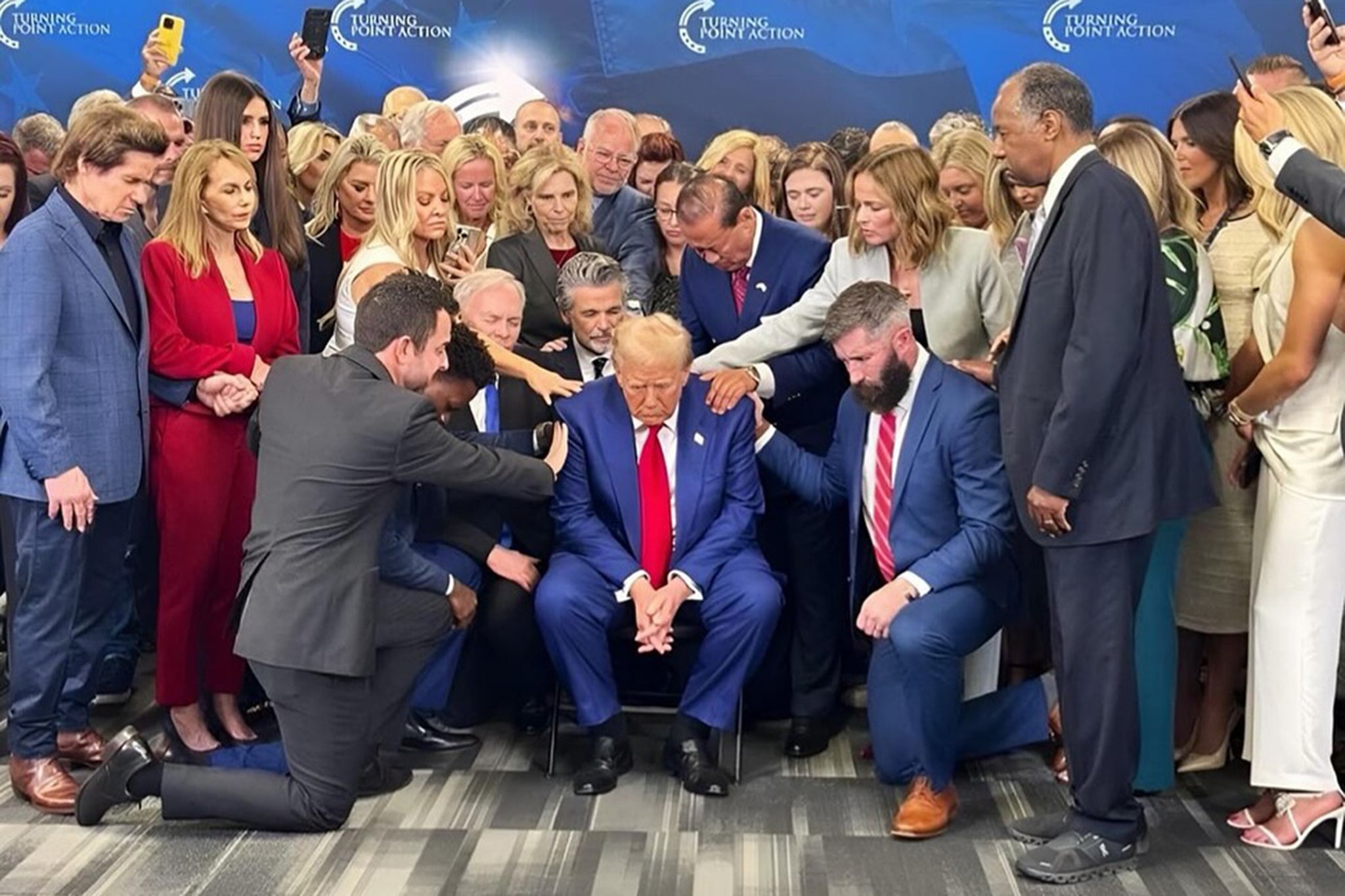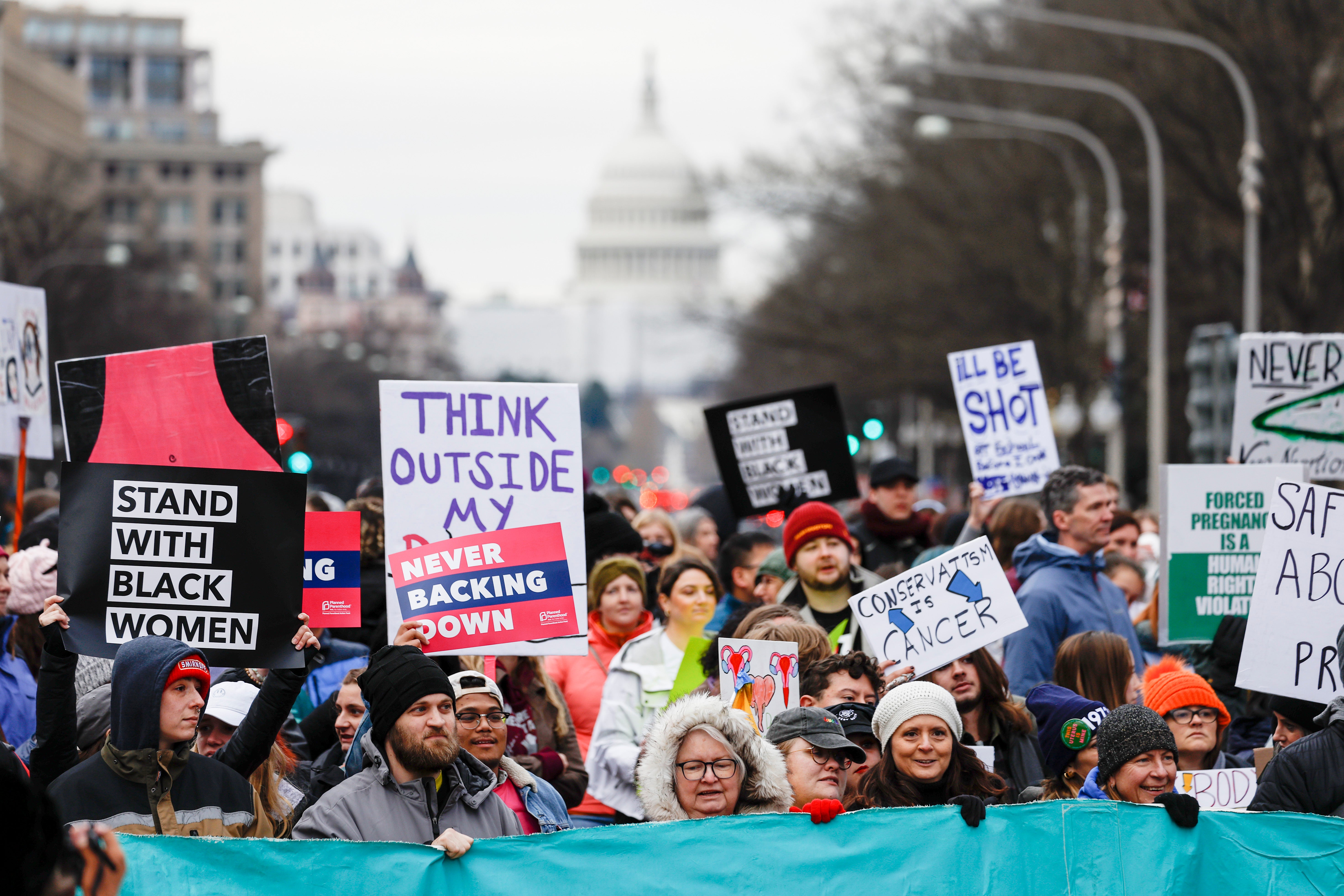‘Trump’s America feels more like The Handmaid’s Tale every day’
Nearly 100 days after the self-proclaimed ‘fertilisation president’ came to power, American women are feeling disturbed by the Trump administration’s obsession with their bodies and who controls them, writes Anna Hart

When Donald Trump told a room full of women assembled at the White House, “I’ll be known as the fertilisation president”, it brought many chilling things to mind. This is a man who boasted on Access Hollywood that women let him “grab ’em by the p***y”, who has taken credit for overturning Roe v Wade while abruptly removing access to contraception across the world, and supports a deputy who derided women in positions of power in the US as “a bunch of childless cat ladies who are miserable at their own lives”.
And now the president was boasting about some vague policies to increase access to IVF. “We’re going to have tremendous, tremendous goodies in the bag for women, too; the women between the fertilisation and all of the other things that we’re talking about,” he said, at an event to mark Women’s History Month.
“It’s going to be, it’s going to be great,” he assured the room, with his trademark delivery of an overripe and incoherent game show host. Adding: “I’ll be known as the fertilisation president, that’s not bad, that’s not bad. I’ve been called much worse. Actually, I like it, right? I like it.”
Improved access to expensive fertilisation treatment would normally be something to be celebrated, but many American women feel far from “great” about Trump’s treatment of women’s bodies. As Chloe, a 35-year-old teacher living in Park Slope in Brooklyn puts it, “It feels absolutely terrifying to be a woman in America right now, but women are supposed to be grateful for this extra opportunity to bring a child into this mess? America under Trump gets more like The Handmaid’s Tale every day.”
On her February trip to Australia, Chloe stocked up on a year’s worth of the contraceptive pill to bring back to the US. “We just don’t know what will change next in the US regarding women’s reproductive rights,” she says.
Having spent the past four months based in New York, The Handmaid’s Tale comparison is one I heard often. As the Pulitzer Prize-winning author Margaret Atwood wrote in The Atlantic, “I invented Gilead. The Supreme Court is making it real.”
In Margaret Atwood’s dystopian novel, the Republic of Gilead, a theocratic dictatorship, has overthrown the United States, establishing a society where women are stripped of their rights and forced into reproductive servitude, while men hold all power and authority. While the US is not quite there yet, the dystopian parallels between the series and real life sharpen every day. The Trump administration is one obsessed with a “fertility crisis”, often pitting women against each other. Many leading figures in the administration repeatedly use rhetoric that reduces women to their biological functions as child bearers.
In September 2024, Joyce Vance, a former US attorney appointed by Barack Obama, wrote in her hit Substack newsletter, Civil Discourse, that Trump’s posts about women on Truth Social are written “with all the fervour of a man envisioning a future that is part Stepford Wives and part The Handmaid’s Tale”.
On the presidential campaign trail in 2024, Trump declared himself “the father of IVF”, whilst blithely admitting he’d only recently learned what it is. In this new order, Trump recognises “the importance of family formation and that our nation’s public policy must make it easier for loving and longing mothers and fathers to have children”, calling on policymakers to “protect IVF access”. Note the use of “loving mothers and fathers”. Currently, only seven states – Colorado, Delaware, Illinois, Maine, Maryland, New Jersey and New York – require IVF benefits to include same-sex couples, according to a report from the non-profit news website Stateline.

Fuelling this rhetoric around America’s dropping fertility rates is billionaire baby daddy Elon Musk, a father of 14 children (some through IVF), who believes that the “collapsing birth rate is the biggest danger civilization faces by far”. Musk has said that declining global fertility rates are “not just a crisis, but the crisis”. Vice-president JD Vance got the memo, and, upon taking office, declared: “I want more babies in the United States of America.”
All this nationalist pronatalism naturally plays well to the fundamentalist Christian far right, with (some strands of) the church and the state joining voices to instruct women it’s their moral and patriotic duty to procreate. It also nods to far-right “Great Replacement” conspiracy theorists who shout about “white extinction” and stoke fears about a non-white population “displacing” a white majority.
“I mean, I get ‘tradwife’ content on my socials, but is this really driven by women?” asks Chloe. “We all know who controls social media algorithms … and it’s not women.”
For people experiencing fertility issues, medical professionals in the field, and economists and sociologists concerned with falling birth rates, Trump’s fixation on IVF and fertility in general is bittersweet. Falling birth rates are indeed an economic problem, as countries face the impact of both ageing, declining populations and a reduced workforce in proportion to retired people and other people requiring support.
In the US, the birth rate is at an all-time low of 1.6, below the 2.0 level needed for the nation’s population to sustain itself. But most demographers detest alarmist talk of a “demographic timebomb” and recommend a long-term strategy of improved social services, access to medical care, better maternity and paternity provision and affordable childcare, to encourage more people to have children.

Professor Geeta Nargund is lead consultant for reproductive medicine at St George’s University Hospital in London and medical director at Create Fertility. As the UK contributor to a major international report on fertility policy and population decline, she argues that holistic family-friendly policies such as cheaper childcare, more generous parental leave, and financial incentives to have children will have the most impact on tackling the population crisis.
“Infertility is a medical condition, but political infertility is the impact of decisions taken by policymakers that prevent fair and equal access to assisted reproduction services or create socio-economic conditions that act as a deterrent to starting a family,” says Nargund.
“The solution is family-friendly policies, including affordable childcare, equitable parental leave, and flexible workplace arrangements,” she says. “Policymakers must also ensure all members of society are given equal access to assisted reproduction services, including single women and the LGBT community.” The way Nargund sees it, while increasing access to IVF is positive, it only makes sense as part of broad and long-term reforms and supportive services.
Demanding that women have more children, while systematically disempowering women, is less of a gift and more of a toxic system of control. “I’ve never been more worried about losing my job, much of the country is losing access to abortions, reproductive health screening and contraception, and I’ve never felt more marginalised and threatened as a woman,” says my friend Nenah, a 29-year-old from New Jersey who works in renewable energy. “We have the most misogynistic president in US history. We have sweeping redundancies across traditionally female-friendly industries like education, healthcare and the non-profit sector. I feel a lot less inclined to become a mother under Trump than I ever did before.”

While Trump is happy to talk about “goodies for women” and “protecting the women whether they like it or not”, in his attack on DEI (Diversity, Equity and Inclusion), he scrubbed the term “women” from all US public websites and bodies, removing any policies specific to or references to “women in leadership”. So “gender ideology” isn’t welcome in the workplace, apparently, but Trump, Musk and JD Vance are fine getting gender-specific if we’re talking about women’s bodies … and how much control women have over our bodies.
Another friend, who works in high school education in California, tells me she’s already noticed a shift in how teenage boys treat women. “It’s not just ‘influencers’ like Andrew Tate; the most powerful men in America right now are the absolute worst male role models, and kids see them on news clips every day.”
There are countless incidents of blatant misogynistic abuse – such as Trump’s personal attack on long-standing rival Nancy Pelosi. He said: “She’s a bad person. Evil. She’s an evil, sick, crazy...” before mouthing the word “bitch” into the microphone. Elon Musk’s PAC ran an advertisement that opened with “Kamala Harris is a C Word”, later unveiling the word as “communist”. JD Vance told an Atlanta rally, “We’re going to take out the trash, and the trash’s name is Kamala Harris.”
Trump has bragged about his part in overturning Roe v Wade in 2022, an anti-abortion stance that inquests have found contributed to the preventable deaths of a number of pregnant women in Texas, Alabama and Georgia. He’s also cut tens of millions of dollars in funding to reproductive health clinics providing contraception, both in the US, and in nations that relied on US aid.
“And this is the world I’m being asked to bring a daughter into?” says Chloe. “They have halted three generations of progress that we have made as a society, to lift women up and empower us and prove we’re more than vessels for babies and male desire. I feel like I’m no longer an equal.”
Donald Trump’s gleeful claim of a creepy new “fertilisation president” moniker is consistent with the paternalistic tone we heard last October when he threatened to “protect the women, whether they like it or not”. In a vacuum, wider access to fertility treatment sounds like a positive, but in the context of the Trump administration’s broader attack on reproductive rights and gender parity, it seems predatory, controlling, fundamentally patriarchal… and straight out of Gilead.
*Some names have been changed






Join our commenting forum
Join thought-provoking conversations, follow other Independent readers and see their replies
Comments